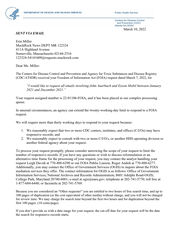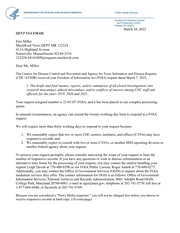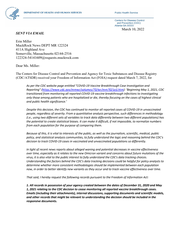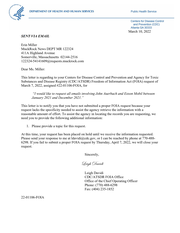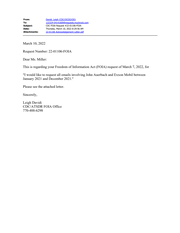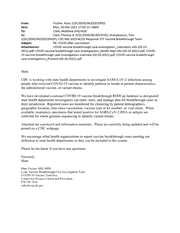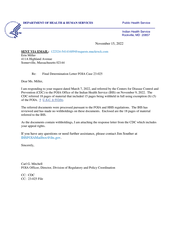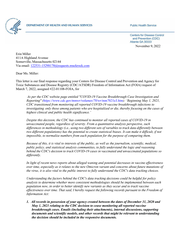COVID-19 Breakthrough Reporting Methodology Changes (CDC)
It is a clone of this request.
| Tracking # |
22-01106-FOIA 22-01108-FOIA 22-01107-FOIA |
| Submitted | Dec. 21, 2021 |
| Est. Completion | None |
MuckRock users can file, duplicate, track, and share public records requests like this one. Learn more.
Communications
From: Erin Marie Miller
To Whom It May Concern:
Pursuant to the Freedom of Information Act, I hereby request the following records:
As per the CDC website page entitled "COVID-19 Vaccine Breakthrough Case Investigation and Reporting" (https://www.cdc.gov/mmwr/volumes/70/wr/mm7021e3.htm): "Beginning May 1, 2021, CDC transitioned from monitoring all reported COVID-19 vaccine breakthrough infections to investigating only those among patients who are hospitalized or die, thereby focusing on the cases of highest clinical and public health significance."
Despite this decision, the CDC has continued to monitor all reported cases of COVID-19 in unvaccinated people, regardless of severity. From a quantitative analysis perspective, such differences in methodology (i.e., using two different sets of variables to track data differently between two different populations) has the potential to create statistical biases. It can make it difficult, if not impossible, to normalize numbers from each population for the purpose of comparing them.
Because of this, it is vital to interests of the public, as well as the journalism, scientific, medical, public policy, and statistical analysis communities, to fully understand the logic and reasoning behind the CDC's decision to track COVID-19 cases in vaccinated and unvaccinated populations so differently.
In light of recent news reports about alleged waning and potential decreases in vaccine effectiveness over time, especially as it relates to the new Omicron variant and concerns about future mutations of the virus, it is also vital to the public interest to fully understand the CDC's data tracking choices. Understanding the factors behind the CDC's data tracking decisions could be helpful for policy analysts to determine whether more consistent methodologies should be implemented between each population now, in order to better identify new variants as they occur and to track vaccine effectiveness over time.
That said, I hereby request the following records pursuant to the Freedom of Information Act:
1. All records in possession of your agency created between the dates of December 31, 2020 and May 1, 2021 relating to the CDC decision to cease monitoring all reported vaccine breakthrough cases. Emails (including their attachments), internal discussions, supporting documents and scientific models, and other records that might be relevant to understanding the decision should be included in the responsive documents.
In order to help determine my status to assess fees, you should know that I am a freelance journalist whose work is published frequently by print and digital news outlets and magazines. As a member of the media, I request a waiver of all fees.
The requested information will be made available to the general public, and this request is not being made for commercial purposes. Disclosure of the requested information to me is in the public interest because it is likely to contribute significantly to public understanding of the impact of public health and policy decisions, as well as operations and/or activities of the government, and is not primarily in my commercial interest. I am willing to pay up to $25 for the requested information. If the fee for this request exceeds this amount, please notify me in writing for permission prior to beginning work on the request.
I would prefer the request filled electronically, by e-mail attachment if available or CD-ROM if not.
Thank you in advance for your anticipated cooperation in this matter. I look forward to receiving your response to this request within 20 business days, as the statute requires.
Sincerely,
Erin Miller
From: Muckrock Staff
To Whom It May Concern:
I wanted to follow up on the following Freedom of Information Act request, copied below, and originally submitted on March 7, 2022. Please let me know when I can expect to receive a response.
Thanks for your help, and let me know if further clarification is needed.
From: Centers for Disease Control and Prevention
Dear Erin Miller,
Your request has been received by the Centers for Disease Control and Prevention / Agency for Toxic Substances and Disease Registry. The request has been assigned tracking # 22-01107-FOIA, please log into your account and review your submission.
The application address is https://foia.cdc.gov/.
Thank you,
Centers for Disease Control and Prevention / Agency for Toxic Substances and Disease Registry
From: Centers for Disease Control and Prevention
Dear Erin Miller,
Your request has been received by the Centers for Disease Control and Prevention / Agency for Toxic Substances and Disease Registry. The request has been assigned tracking # 22-01108-FOIA, please log into your account and review your submission.
The application address is https://foia.cdc.gov/.
Thank you,
Centers for Disease Control and Prevention / Agency for Toxic Substances and Disease Registry
From: Centers for Disease Control and Prevention
Dear Erin Miller,
Your request has been received by the Centers for Disease Control and Prevention / Agency for Toxic Substances and Disease Registry. The request has been assigned tracking # 22-01106-FOIA, please log into your account and review your submission.
The application address is https://foia.cdc.gov/.
Thank you,
Centers for Disease Control and Prevention / Agency for Toxic Substances and Disease Registry
From: Centers for Disease Control and Prevention
March 10, 2022
Request Number: 22-01106-FOIA
Dear Ms. Miller: This is regarding your Freedom of Information Act (FOIA) request of March 7, 2022, for
"I would like to request all emails involving John Auerbach and Exxon Mobil between January 2021 and December 2021."
Please see the attached letter.
Sincerely,
Leigh Davidi
CDC/ATSDR FOIA Office
770-488-6298
From: Centers for Disease Control and Prevention
March 10, 2022
Request Number: 22-01107-FOIA
Dear Ms. Miller: This is regarding your Freedom of Information Act (FOIA) request of March 7, 2022, for
"request for the drafts and final memos, reports, and/or summaries of all closed investigations into research misconduct, ethical misconduct, and/or conflicts of interest among CDC staff and officials for the years 2019, 2020 and 2021."
Please see the attached letter.
Sincerely,
Leigh Davidi
CDC/ATSDR FOIA Office
770-488-6298
From: Centers for Disease Control and Prevention
March 10, 2022
Request Number: 22-01108-FOIA
Dear Ms. Miller: This is regarding your Freedom of Information Act (FOIA) request of March 7, 2022, for
All records in possession of your agency created between the dates of December 31, 2020 and May 1, 2021 relating to the CDC decision to cease monitoring all reported vaccine breakthrough cases. Emails (including their attachments), internal discussions, supporting documents and scientific models, and other records that might be relevant to understanding the decision should be included in the responsive documents.
Please see the attached letter.
Sincerely,
Leigh Davidi
CDC/ATSDR FOIA Office
770-488-6298
From: Centers for Disease Control and Prevention
March 10, 2022
Request Number: 22-01106-FOIA
Dear Ms. Miller: This is regarding your Freedom of Information Act (FOIA) request of March 7, 2022, for "I would like to request all emails involving John Auerbach and Exxon Mobil between January 2021 and December 2021."
Please see the attached letter.
Sincerely,
Leigh Davidi
CDC/ATSDR FOIA Office
770-488-6298
From: Erin Marie Miller
Hello,
You seem to have sent me the wrong letter. That is not the information I requested -- you must have confused two different requests.
Please review my actual FOIA request (22-01108-FOIA) and provide me with the correct response. If I have not heard back by next week, I will file an appeal.
Best,
Erin Miller
From: Centers for Disease Control and Prevention
Dear Ms. Miller,
Thank you for your email.
Please see the attached letters (acknowledgement letter and broad/vague letter) that have been sent to you for your FOIA request, #22-01106. We need additional information from you regarding this request. I hope this clears up any mix up for you.
You received only an acknowledgement letter (attached) for your two other requests, #22-01107 and #22-01108.
Let me know if you have additional concerns.
Kind regards,
Leigh
From: Erin Marie Miller
Hi Leigh,
Your agency has mistakenly sent me an acknowledgement letter for the wrong request twice now. The letter you sent to me on 3/11/2022 is not for my request. I did not ask for information about Exxon Mobile.
My original request was filed with your agency on 3/7/2022. It asked for "All records in possession of your agency created between the dates of December 31, 2020 and May 1, 2021 relating to the CDC decision to cease monitoring all reported vaccine breakthrough cases. Emails (including their attachments), internal discussions, supporting documents and scientific models, and other records that might be relevant to understanding the decision should be included in the responsive documents."
My request was originally assigned tracking number 22-01107-FOIA. Since then, your agency has assigned my request two additional incorrect tracking numbers ( 22-01107-FOIA and 22-01108-FOIA), so I have no idea what its correct tracking number is now.
Your acknowledgement letter is for the incorrect request.
Again, please acknowledge my actual request. In the meantime, since this is the second time your agency has done this, I am filing an appeal.
From: Centers for Disease Control and Prevention
Thank you for your email, Ms. Miller.
Seemingly, we received the attached two requests from you. Please review the two attached FOIA requests and advise me if these are both accurate requests submitted by you.
I have identified the error with the #22-01106 request. This request was submitted by another requester. Therefore, I regret sending you a letter for this request. We will update our records accordingly.
I look forward to understanding if you have submitted the two attached requests.
Kind regards,
Leigh
From: Erin Marie Miller
Deputy Agency Chief FOIA Officer,
Office of the Assistant Secretary for Public Affairs,
U.S. Department of Health and Human Services
Re: Freedom of Information Act Appeal
To Whom It May Concern:
This is an appeal under the Freedom of Information Act.
On March 7, 2022, I requested documents under the Freedom of Information Act from the CDC pertaining to "all records in possession of the agency created between the dates of December 31, 2020 and May 1, 2021 relating to the CDC decision to cease monitoring all reported vaccine breakthrough cases. Emails (including their attachments), internal discussions, supporting documents and scientific models, and other records that might be relevant to understanding the decision should be included in the responsive documents."
On March 10, 2022, I received an acknowledgement letter from Roger Andoh pertaining to a request that was not mine (22-01106-FOIA). That request sought information about emails pertaining to ExxonMobil. That letter obviously acknowledged someone else's request, and not mine.
Later on March 10, 2022, I received another acknowledgement letter from Roger Andoh pertaining to my actual request (22-01108-FOIA) seeking information about the CDC's decision to cease monitoring all reported vaccine breakthrough cases. This was the correct request, and so the agency's confusion seemed to have been corrected.
However, later still on March 10, 2022, I received another communication from Leigh Davidi regarding 22-01106-FOIA (the incorrect ExxonMobil request). I assume this letter should have been addressed to a different requester, because I had not requested any information about ExxonMobil from the CDC. However, this letter contained my contact information, which was confusing.
The agency had entered the wrong requester information into request #22-01106.
The letter informed me that request #22-01106 had been put on hold until I provided additional clarifying information -- which is impossible for me to do, since I did not make that request.
On March 11, 2022, I emailed Leigh Davidi to let them know they had mixed up the requests, and that I was receiving correspondence about someone else's request -- request #22-01106 is not mine.
Leigh Davidi then responded, ignoring what I had said and again letting me know that request #22-01106 was on hold until I provided further information about a request, even though I had just clarified in writing that #22-01106 was not mine.
The agency is clearly confused about the requester for #22-01106, and needs to review and update that request's information to include the correct requester -- which is not me.
I have no idea how to communicate this mix-up to the agency in any other way, having tried twice now. So, I am appealing the agency's decision to assign someone else's FOIA request to me. I do not know who the ExxonMobil request (#22-01106) belongs to, but any documents associated with that request need to find their way to the correct requester -- not me.
If you have any questions while handling this appeal, you can email me at the email address listed below. I would prefer that all communications related to this appeal be in writing if possible.
Thank you for your consideration of this appeal.
Sincerely,
Erin Miller
MuckRock News DEPT
MR 122324 411A
Highland Avenue
Somerville, Massachusetts 02144-2516
requests@muckrock.com
From: Centers for Disease Control and Prevention
Good morning,
Please find our FOIA Office final response in regards to your Indian Health Service FOIA request: FOIA Case 23-025.
Attached to this e-mail is our final response letter, responsive documents, original request and response letter from CDC.
Your FOIA case is closed.
Thank you,
Jim Souther
Government Information Specialist
Indian Health Service
5600 Fishers Lane, Mail stop: 09E47
Rockville, MD 20857
IHSFOIAMailbox@ihs.gov<mailto:IHSFOIAMailbox@ihs.gov>
From: Erin Marie Miller
Dear Brandon Gaylord,
I received your final determination letter on November 9, 2022 regarding FOIA request #22-01108-FOIA seeking records in possession of your agency created between the dates of December 31, 2020 and May 1, 2021 relating to the CDC decision to cease monitoring all reported vaccine breakthrough cases. Emails (including their attachments), internal discussions, supporting documents and scientific models, and other records that might be relevant to understanding the decision should be included in the responsive documents.
Your response indicated that you had delivered 154 pages of documents to me under this request, including 127 pages released in part; 293 pages and eight Excel spreadsheets and one .CSV file withheld in full. You mentioned that "some information was withheld" after a review of the documents.
However, no documents were attached to your final letter to me. To clarify, I have not received any of the 154 pages of documents you told me you gave to me under this request. Per the FOIA, you are required to provide requesters with information. Please send the documents to me immediately.
In the event that MuckRock staff have accidentally withheld information related to this request, I have also notified them separately about the missing documents.
In addition, I will file an appeal in order to procure the requested documents that have not been delivered.
Best,
Erin Marie Miller
From: Erin Marie Miller
Department of Health and Human Services (HHS) Office of the Secretary (OS)
Freedom of Information Act Office
Hubert H. Humphrey Building, Room 729H
200 Independence Avenue, SW
Washington, D.C. 20201
Dec. 15, 2022
Re: APPEAL - Freedom of Information Act
To Whom It May Concern:
This is an appeal under the Freedom of Information Act regarding FOIA request #22-01108-FOIA.
On March 7, 2022, I filed a request under the Freedom of Information Act from the Centers for Disease Control and Prevention and Agency for Toxic Substances and Disease Registry (CDC/ATSDR) for all records in possession of the agency created between the dates of December 31, 2020 and May 1, 2021 relating to the CDC decision to cease monitoring all reported vaccine breakthrough cases. Emails (including their attachments), internal discussions, supporting documents and scientific models, and other records that might be relevant to understanding the decision should be included in the responsive documents.
On March 8, 2022, the agency assigned the request its tracking number.
On March 10, 2022, Leigh Davidi acknowledged the request.
On November 9, 2022, I received a final response letter from Roger Andoh, CDC/ATSDR FOIA Officer at the Office of the Chief Operating Officer regarding my request. In that letter, Mr. Andoh indicated that the agency had located 574 pages, eight Excel spreadsheets, and one .CSV file of responsive records (154 pages released in full; 127 pages released in part; 293 pages and eight Excel spreadsheets and one .CSV file withheld in full) responsive to my request. The letter also indicated that "some information" had been withheld from me under 5 U.S.C. §552 Exemptions 5 and 6. The foreseeable harm standard was considered when applying these redactions.
However, as far as I am able to tell, no documents were provided to me at all out of the 574 total responsive records. This seems to mean that all 574 documents were withheld in their entirety, as I was not provided with any documents that even contained redacted information. This is obviously unacceptable.
I am appealing the agency's decision to withhold the responsive documents related to my request based on the following arguments:
1. I appeal the withholding of information under Exemption 5 and request that the FOIA appeals staff review the responsive records for the improper application of Exemption 5 and release any records to which the exemption does not legitimately apply under the law. I believe there is a high likelihood that the agency improperly applied the exemption to at least some of the information contained within the responsive records.
It is highly unlikely that the foreseeable harm standard could be legitimately applied to all of the responsive records related to this request. According to FOIA.Wiki, "as an initial matter, Exemption 5 only applies to records that are inter-agency or intra-agency memorandums or letters. The FOIA defines 'agency' as 'any executive department, military department, Government corporation, Government controlled corporation, or other establishment in the executive branch of the Government (including the Executive Office of the President), or any independent regulatory agency.' 'Intra-agency' communications 'are those that remain inside a single agency,” while 'inter-agency' communications 'go from one governmental agency to another.'"
If officials from the CDC communicated with any third-party consultants while deliberating policy changes, the "Consultant Corollary" doctrine would nullify the documents' protections under by Exemption 5 -- that is, Exemption 5 would not apply to agency communications with third parties (see Klamath Water Users Protective Ass’n, 532 U.S. at 10. See, e.g., Hoover v. U.S. Dep’t of Interior, 611 F.2d 1132, 1138 (5th Cir. 1980); Lead Industries Ass’n v. OSHA, 610 F.2d 70, 83 (2d Cir. 1979). Exemption 5 also does not apply to communications between government agencies and government contractors (see Judicial Watch v. Dep’t of Army, 435 F.Supp.2d 81, 91 (D.D.C. 2006).
Because the agency did not provide any documents to me, even in redacted form, it is impossible to determine whether any communications with third parties or contractors took place or whether Exemption 5 was improperly applied. However, given the U.S. government's increasing use of contractors over the years, it is likely that a contractor, consultant or other third party was included in the decision-making process related to this request. Any communications between the agency and outside contractors, consultants or third parties would not be legally protected by Exemption 5.
Again, I request that the FOIA appeals staff review the withheld records for the improper application of Exemption 5 and release any records to which it does not legitimately apply under the law.
2. I appeal the withholding of information under Exemption 6 and request that the FOIA appeals staff review the withheld records for the improper application of Exemption 6 and release any records to which it does not legitimately apply under the law. I believe there is a high likelihood that the agency improperly applied the exemption to at least some of the information contained within the responsive records.
Information such as patient identifiers could be easily redacted from the responsive documents and is not a sufficient reason to withhold the entirety of the responsive records related to this FOIA request. Regarding the application of Exemption 6 to patient records under this request, a federal court recently found that the NIH's application of Exemption 6 to patient data was improper and that the "NIH had failed to show that patient records concerning the Phase I clinical trial of the Moderna vaccine for COVID-19 are protected by Exemption 6 (invasion of privacy)" (see Informed Consent Action Network v. National Institutes of Health, (2021)). I believe the decision in Consent Action Network v. NIH relates similarly to the withheld records under my request.
Regarding the withholding of personnel files due to privacy concerns, per FOIA.Wiki, "The [U.S. Supreme] Court also emphasized that even where a 'personnel file' is at issue, an agency cannot apply a blanket exemption to withhold all of the information contained in such a file and must release it unless 'a clearly unwarranted invasion of privacy' would result" (see Dep’t of Air Force v. Rose, 425 U.S. 354, 375 n.14 (1976) (citing S. Rep. No. 89-813, at 9 (1965); H.R. Rep. No. 89-1497, at 11 (1966)).
Per FOIA.Wiki, another factor that may “significantly diminish” the privacy interest is a subject’s public figure or public official status." The privacy interest is also diminished under the FOIA for “[P]ersons who have placed themselves in the public light, e.g., through politics, or voluntarily participate in the public arena have a significantly diminished privacy interest than others" (see Rosenfeld v. U.S. Dep’t of Justice, No. C-07-3240 EMC, 2012 WL 710186 at *5 (N.D. Cal. Mar. 5, 2012)). Further, "the privacy interest in identifying information may be further diminished where the individual identified in the record is deceased" (see Schrecker v. U.S. Dep’t of Justice, 349 F.3d 657, 661 (D.C. Cir. 2003)).
Finally, even if some information contained in the responsive records does meet the threshold for privacy under Exemption 6, the government still has the responsibility of balancing privacy with the public interest. Because the requested records are related to an important public health and data collection decision that may have impacted millions of Americans, the requested records could provide important insight into the deliberations and policy-making decisions surrounding a historic global pandemic. Beyond their historical importance, the release of the requested records would clearly be in the public interest for the purpose of accountability -- something that is deeply important in a well-functioning democracy -- as well as help inform future elected officials and public health officials about possible mistakes that were made in public health policy during the pandemic. The release of the requested information is vital to the future of our nation. Without having access to the requested records, the public -- as well as future leaders and public health officials -- are all left in the dark.
Due to those facts, it is likely that the withheld information contained within the requested records meets the "central purpose" requirement that would be a legal condition for the documents' release under federal law (see Elec. Frontier Found. v. Office of the Dir. of Nat’l Intelligence, 639 F.3d 876, 888 (9th Cir. 2010); Citizens for Responsibility & Ethics in Wash., 2012 WL 45499 at *7). This would mean that Exemption 6 does not apply to the requested records due to their importance to the public interest.
This appeal has been filed with the appropriate email address (HHS.ACFO@hhs.gov) as outlined on the HHS FOIA Contacts webpage (https://www.hhs.gov/foia/contacts/index.html) before the deadline to appeal (Tuesday, February 7, 2023).
At your earliest convenience, please provide me with an emailed acknowledgment that this appeal has been received.
If you have any questions while handling this appeal, you can contact me at the email address from which it originated. I would prefer that all communications related to this appeal be in writing if possible, so I am not providing a phone number.
Thank you for your consideration of this appeal.
Sincerely,
Erin Marie Miller
requests@muckrock.com
MuckRock News DEPT
MR 122324
411A Highland Ave
Somerville, MA 02144-2516
From: Erin Marie Miller
Department of Health and Human Services (HHS) Office of the Secretary (OS)
Freedom of Information Act Office
Hubert H. Humphrey Building, Room 729H
200 Independence Avenue, SW
Washington, D.C. 20201
Dec. 16, 2022
Re: APPEAL - Freedom of Information Act
To Whom It May Concern:
This is an appeal under the Freedom of Information Act regarding FOIA request #22-01108-FOIA.
I attempted to send this email via MuckRock on Dec. 15, 2022 but the MuckRock system did not successfully deliver the email to your agency. If this appeal is received as a duplicate, please note that both appeals are identical and either may be used.
On March 7, 2022, I filed a request under the Freedom of Information Act from the Centers for Disease Control and Prevention and Agency for Toxic Substances and Disease Registry (CDC/ATSDR) for all records in possession of the agency created between the dates of December 31, 2020 and May 1, 2021 relating to the CDC decision to cease monitoring all reported vaccine breakthrough cases. Emails (including their attachments), internal discussions, supporting documents and scientific models, and other records that might be relevant to understanding the decision should be included in the responsive documents.
On March 8, 2022, the agency assigned the request its tracking number.
On March 10, 2022, Leigh Davidi acknowledged the request.
On November 9, 2022, I received a final response letter from Roger Andoh, CDC/ATSDR FOIA Officer at the Office of the Chief Operating Officer regarding my request. In that letter, Mr. Andoh indicated that the agency had located 574 pages, eight Excel spreadsheets, and one .CSV file of responsive records (154 pages released in full; 127 pages released in part; 293 pages and eight Excel spreadsheets and one .CSV file withheld in full) responsive to my request. The letter also indicated that "some information" had been withheld from me under 5 U.S.C. §552 Exemptions 5 and 6. The foreseeable harm standard was considered when applying these redactions.
However, as far as I am able to tell, no documents were provided to me at all out of the 574 total responsive records. This seems to mean that all 574 documents were withheld in their entirety, as I was not provided with any documents that even contained redacted information. This is obviously unacceptable.
I am appealing the agency's decision to withhold the responsive documents related to my request based on the following arguments:
1. I appeal the withholding of information under Exemption 5 and request that the FOIA appeals staff review the responsive records for the improper application of Exemption 5 and release any records to which the exemption does not legitimately apply under the law. I believe there is a high likelihood that the agency improperly applied the exemption to at least some of the information contained within the responsive records.
It is highly unlikely that the foreseeable harm standard could be legitimately applied to all of the responsive records related to this request. According to FOIA.Wiki, "as an initial matter, Exemption 5 only applies to records that are inter-agency or intra-agency memorandums or letters. The FOIA defines 'agency' as 'any executive department, military department, Government corporation, Government controlled corporation, or other establishment in the executive branch of the Government (including the Executive Office of the President), or any independent regulatory agency.' 'Intra-agency' communications 'are those that remain inside a single agency,” while 'inter-agency' communications 'go from one governmental agency to another.'"
If officials from the CDC communicated with any third-party consultants while deliberating policy changes, the "Consultant Corollary" doctrine would nullify the documents' protections under by Exemption 5 -- that is, Exemption 5 would not apply to agency communications with third parties (see Klamath Water Users Protective Ass’n, 532 U.S. at 10. See, e.g., Hoover v. U.S. Dep’t of Interior, 611 F.2d 1132, 1138 (5th Cir. 1980); Lead Industries Ass’n v. OSHA, 610 F.2d 70, 83 (2d Cir. 1979). Exemption 5 also does not apply to communications between government agencies and government contractors (see Judicial Watch v. Dep’t of Army, 435 F.Supp.2d 81, 91 (D.D.C. 2006).
Because the agency did not provide any documents to me, even in redacted form, it is impossible to determine whether any communications with third parties or contractors took place or whether Exemption 5 was improperly applied. However, given the U.S. government's increasing use of contractors over the years, it is likely that a contractor, consultant or other third party was included in the decision-making process related to this request. Any communications between the agency and outside contractors, consultants or third parties would not be legally protected by Exemption 5.
Again, I request that the FOIA appeals staff review the withheld records for the improper application of Exemption 5 and release any records to which it does not legitimately apply under the law.
2. I appeal the withholding of information under Exemption 6 and request that the FOIA appeals staff review the withheld records for the improper application of Exemption 6 and release any records to which it does not legitimately apply under the law. I believe there is a high likelihood that the agency improperly applied the exemption to at least some of the information contained within the responsive records.
Information such as patient identifiers could be easily redacted from the responsive documents and is not a sufficient reason to withhold the entirety of the responsive records related to this FOIA request. Regarding the application of Exemption 6 to patient records under this request, a federal court recently found that the NIH's application of Exemption 6 to patient data was improper and that the "NIH had failed to show that patient records concerning the Phase I clinical trial of the Moderna vaccine for COVID-19 are protected by Exemption 6 (invasion of privacy)" (see Informed Consent Action Network v. National Institutes of Health, (2021)). I believe the decision in Consent Action Network v. NIH relates similarly to the withheld records under my request.
Regarding the withholding of personnel files due to privacy concerns, per FOIA.Wiki, "The [U.S. Supreme] Court also emphasized that even where a 'personnel file' is at issue, an agency cannot apply a blanket exemption to withhold all of the information contained in such a file and must release it unless 'a clearly unwarranted invasion of privacy' would result" (see Dep’t of Air Force v. Rose, 425 U.S. 354, 375 n.14 (1976) (citing S. Rep. No. 89-813, at 9 (1965); H.R. Rep. No. 89-1497, at 11 (1966)).
Per FOIA.Wiki, another factor that may “significantly diminish” the privacy interest is a subject’s public figure or public official status." The privacy interest is also diminished under the FOIA for “[P]ersons who have placed themselves in the public light, e.g., through politics, or voluntarily participate in the public arena have a significantly diminished privacy interest than others" (see Rosenfeld v. U.S. Dep’t of Justice, No. C-07-3240 EMC, 2012 WL 710186 at *5 (N.D. Cal. Mar. 5, 2012)). Further, "the privacy interest in identifying information may be further diminished where the individual identified in the record is deceased" (see Schrecker v. U.S. Dep’t of Justice, 349 F.3d 657, 661 (D.C. Cir. 2003)).
Finally, even if some information contained in the responsive records does meet the threshold for privacy under Exemption 6, the government still has the responsibility of balancing privacy with the public interest. Because the requested records are related to an important public health and data collection decision that may have impacted millions of Americans, the requested records could provide important insight into the deliberations and policy-making decisions surrounding a historic global pandemic. Beyond their historical importance, the release of the requested records would clearly be in the public interest for the purpose of accountability -- something that is deeply important in a well-functioning democracy -- as well as help inform future elected officials and public health officials about possible mistakes that were made in public health policy during the pandemic. The release of the requested information is vital to the future of our nation. Without having access to the requested records, the public -- as well as future leaders and public health officials -- are all left in the dark.
Due to those facts, it is likely that the withheld information contained within the requested records meets the "central purpose" requirement that would be a legal condition for the documents' release under federal law (see Elec. Frontier Found. v. Office of the Dir. of Nat’l Intelligence, 639 F.3d 876, 888 (9th Cir. 2010); Citizens for Responsibility & Ethics in Wash., 2012 WL 45499 at *7). This would mean that Exemption 6 does not apply to the requested records due to their importance to the public interest.
This appeal has been filed with the appropriate email address (HHS.ACFO@hhs.gov) as outlined on the HHS FOIA Contacts webpage (https://www.hhs.gov/foia/contacts/index.html) before the deadline to appeal (Tuesday, February 7, 2023).
At your earliest convenience, please provide me with an emailed acknowledgment that this appeal has been received.
If you have any questions while handling this appeal, you can contact me at the email address from which it originated. I would prefer that all communications related to this appeal be in writing if possible, so I am not providing a phone number.
Thank you for your consideration of this appeal.
Sincerely,
Erin Marie Miller
requests@muckrock.com
MuckRock News DEPT
MR 122324
411A Highland Ave
Somerville, MA 02144-2516
Files
pages
